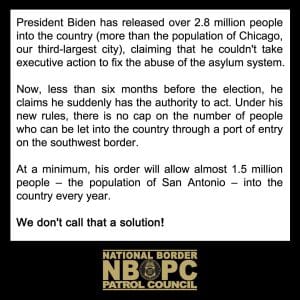On Thursday, May 2, 2013 at 5:05 PM EST, Thomas Winkowski sent an ill-advised message to all CBP employees. His message contained Customs and Border Protection’s (CBP) continued speculation of mere possibilities and failed to shed new light on our current pay issues.
The following will provide the most up to date information we have. It will also explain how we got here, what we’ve done, and what we’re doing.
The Budget Control Act of 2011 and the failure of the U.S. Congress to reach a bipartisan agreement to stem the effects of the Act is what triggered what is known as sequestration. Sequestration is a Congressional mandate, memorialized in law, to cut government spending thereby reducing the federal deficit.
In February, the National Border Patrol Council (NBPC) filed a request for information and a demand to bargain in response to CBP’s sequestration notice. To date, CBP has not furnished any of the requested information nor has it engaged the NBPC in bargaining over sequestration. CBP however bargained with the National Treasury Employees Union (NTEU) and Winkowski signed a memorandum of understanding, which protected the overtime and premium pay of CBP officers, while subjecting them solely to possible furlough days. The NBPC stated it would sign a similar memorandum but CBP refused that offer. It appears Winkowski has no desire to look out for the interests of Border Patrol agents, only CBP officers.
Prior to the 2013 Continuing Resolution (CR), all Border Patrol agents were facing the de-authorization of AUO as well as 14 days of furloughs. Because of the efforts of our agents in sending Union-authored letters to Congress and the efforts of the Union on the hill, Congress funded CBP with $315 million more than 2012 funding level in the prior CR. As far as we are aware, CBP was the only agency in the entire federal government to receive a few million dollars more than the 2012 funding levels. The funding, however, did not exempt CBP from sequestration, which caused funding to be taken off the top of the 2013 CR. In simple terms, the 2012 OBP operating budget was $3.6 billion, and the 2013 OBP operating budget is $3.43 billion.
To deal with the budget shortfall, Winkowski and the leadership of CBP have demonized AUO and painted it as an entitlement. Nothing could be further from the truth since AUO was enacted as and continues to be a huge cost savings measure for the federal government. Not letting truth stand in the way of higher political goals, Secretary Napolitano’s solution has been to de-authorize the use of AUO as the primary overtime system for Border Patrol Agents. The NBPC has been able to hold her off to this point, but she warned the Office of Border Patrol (OBP) that unless they are able to control a system that was specifically designed as uncontrollable (AUO), she will de-authorize AUO and dole out OT in the form of 45 ACT.
The NBPC continues to work with Congress on this issue, as well as on pay reform. This work with Congress has been very productive and encouraging, in complete contrast to the NBPC’s dealings with Winkowski and CBP. As Acting Commissioner of CBP, Winkowski answers to and owes his position to Secretary Napolitano. Neither one are directly accountable to Congress or the American public. Both have recently dishonored themselves by intentionally misrepresenting the security level of the southern border in order to help effectuate immigration reform. This is to be expected from those like Winkowski, who toe the company line for career expediency instead of doing what is best for the security of the country.


